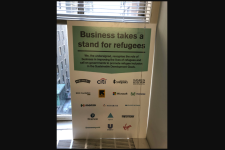Finding the “sweet spot”

Partnerships between humanitarian aid organizations and for-profit companies are celebrated as tools to solve global humanitarian problems while also creating financial value. But this ideal of creating shared value often benefits business more than aid organizations and their beneficiaries.
In a newly published article in the reputable journal Business & Society, PhD student at DIIS Sofie Henriksen, delves into these partnerships to understand what is at stake, when refugee aid is merged with the business strategies of tech companies.
Based on ethnographic fieldwork in San Francisco and New York, the article offers insights into the power relations that shape these partnerships and how the ideal of a “sweet spot” contributes to a profit orientation in humanitarian aid.
Provided technologi is guided by what companies want to contribute - not the needs of refugees
Practically, the findings indicate that concerns about the efficiency and sustainability of state- and NGO-led refugee aid can similarly be raised for refugee-focused CSPs. Increasingly, nonprofits must find ways to implement the technological products and expertise that technology companies want to contribute rather than being guided by the actual needs of refugees.
This dependence on the social impact strategies of technology companies challenges the sustainability and efficiency of partnership projects, as these strategies shift rapidly, and alignment becomes a moving target. While integrative sweet spot partnerships are promoted as mechanisms to innovate, optimize, and fix the refugee system, this article shows that maintaining such partnerships requires significant resources from nonprofits.
As such, integrative CSPs are likely to be more beneficial for businesses, allowing them to donate their expertise rather than money, while nonprofits in the humanitarian field will benefit more from long-term philanthropic partnerships.
Ultimately, the findings of this article suggest that incorporating business value as a measure of success in humanitarian work risks shifting the terms of accountability such that refugee-focused CSPs will be measured primarily on their ability to create value for businesses rather than protection, freedom, and safety for refugees.
DIIS Experts


